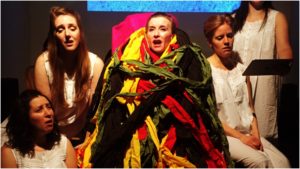
Litmus Residency 2018 Review – ALICE: A Bittersweet Feast Not Fully Fleshed
By Logan MartellThis review is for a work currently in development, and as such does not reflect any future productions.
Mary Prescott’s “ALICE” offers the audience a first-hand journey into the life of a woman utterly at the mercy of those around her. No relation to the works by Lewis Carroll, Prescott’s chamber opera employs a number of creative choices to bring the story to life.
The staging was part art exhibition and part haunted house. In each of the corners stood one of Alice’s tormentors, burdening her younger selves with the abuse, visually represented in the form of long ribbons, that each of the Alices would heap upon her future self. This continued for a little over 20 minutes, which was a little long for my liking, but it allowed the audience the chance to explore the set and observe each of the interactions as they happened simultaneously, thereby immersing them into Alice’s experience.
Each of Alice’s tormentors represented a common relationship taken to a baleful excess: a desperately-clingy lover, a blank-faced Priest mouthing scripture devoid of any comfort, an overbearing mother, etc. Each of their lines, scarce but highly-telling, were delivered in spoken dialogue as opposed to recitative. By the end of the 20 minutes the present Alice had been buried up to her neck in the ribbons of her past trauma in a way that would be comical if it weren’t for the pain it was meant to convey. As this first scene reached its conclusion I found myself wondering exactly where the actual elements of opera were. There didn’t seem much apart from the music; atonal and capturing the lack of any center in Alice’s own life.
And then Alice began to sing.
Having been silent and at the receiving end of everything, soprano Jeanai La Vita cut through the air of abuse the moment she began to vocalize, her tone was pained yet distant, like someone who woke up to find all around them had burned to ashes while she slept. This led into some very fine harmonies with her younger selves as they reflected in unison on their life; one succinct line being “our bittersweet feast,” which I felt encapsulated the anguish of a life too full of the wrong kinds of love. One by one, the Alices walked off with a new credo on their lips: “Wash it away.” Ready to make a clean break, the present Alice began to wrestle out from under her ribbons in her struggle for freedom. After this laborious kind of second birth, Alice, now free, stepped forth from her bondage, leaving the audience with one final “wash it away.”
The whole performance lasted just under an hour, but one that was for the most part well-utilized. The strength of this work lies in Mary Prescott’s composition, the unity of its cast, and its exhibition-method of immersing the audience within the story. The story itself would benefit from being fleshed out further. Though Alice seems to escape from her past relationships, there lingers the feeling of emptiness that remains unfilled. Knowing nothing about the character, apart from what she suffers, it’s hard for her to have an identity of her own or connect with the audience in a way where we feel more emotionally-invested in her life. It bears repeating that Mary Prescott’s “ALICE” is a work still in the midst of its development process. Billing itself as “an immersive chamber opera exploring the entanglement and manipulation of identity in a patriarchal society,” I recognize that I may not be in the right position needed to truly connect with its thematic weight, but I would be very interested in seeing the work in its completed form.


